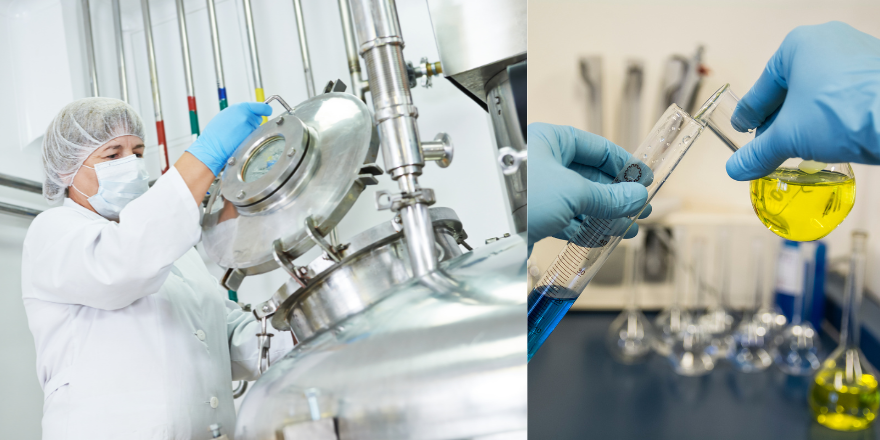Topics: PlanetTogether Software, Constraint-Based Scheduling, Integrating PlanetTogether, Dynamic Scheduling, Enhanced Resource Optimization, Effective Capacity Planning, Real-Time Data Visibility, Advanced What-If Analysis, Integration Flexibility

In chemical manufacturing, staying competitive and maximizing operational efficiency is critical for success. As an Operations Director, your role is central to orchestrating smooth and seamless processes within your facility. One way to achieve this is by harnessing the power of advanced planning and scheduling (APS) tools, combined with effective integration between your existing ERP, SCM, and MES systems.
In this blog, we will delve into the realm of optimization techniques and explore how the integration of PlanetTogether with leading ERP systems like SAP, Oracle, Microsoft, Kinaxis, Aveva, and others can lead to enhanced productivity, cost reduction, and improved decision-making.
Understanding Advanced Planning and Scheduling (APS)
Before we explore the world of optimization, it is essential to understand what advanced planning and scheduling (APS) entails. APS is a powerful technology that enables organizations to streamline their production processes by optimizing resource utilization, reducing lead times, and minimizing operational costs. By integrating real-time data from various systems, APS empowers chemical manufacturing facilities to make informed decisions and quickly adapt to changing demands and market conditions.
The Integration Advantage
When it comes to unlocking the full potential of APS, seamless integration with existing enterprise systems is vital. ERP (Enterprise Resource Planning), SCM (Supply Chain Management), and MES (Manufacturing Execution Systems) are at the core of a chemical manufacturing facility's operations. Integrating APS with these systems allows for a more holistic approach to planning and scheduling, leading to the following key benefits:
Real-Time Data Visibility: Integrating APS with ERP, SCM, and MES systems ensures that all stakeholders have access to real-time data. This visibility enables quick identification of bottlenecks, efficient inventory management, and timely decision-making.
Reduced Lead Times: By optimizing production schedules based on real-time data, you can significantly reduce lead times, leading to faster order fulfillment and improved customer satisfaction.
Resource Optimization: APS integration allows you to balance production lines, labor, and equipment utilization efficiently, maximizing overall resource efficiency.
Enhanced Collaboration: With seamless data flow between different systems, cross-functional collaboration between departments becomes more accessible, leading to a better understanding of interdependencies and improved operational efficiency.
Scenario Simulation: APS integration with ERP and SCM systems enables scenario planning and simulation, facilitating better analysis of "what-if" scenarios and enabling proactive risk management.
PlanetTogether: A Leading APS Solution
PlanetTogether is one of the leading APS software solutions in the market, trusted by numerous chemical manufacturers worldwide. Its robust capabilities enable efficient production planning, scheduling, and optimization to meet the complex demands of the industry.
Key Features of PlanetTogether:
Dynamic Scheduling: PlanetTogether's dynamic scheduling capabilities allow for real-time adjustments to production schedules based on changing priorities, ensuring optimum resource utilization.
Advanced What-If Analysis: With PlanetTogether, Operations Directors can perform sophisticated "what-if" analysis to evaluate multiple scenarios and choose the most optimal one.
Integration Flexibility: PlanetTogether offers seamless integration with various ERP, SCM, and MES systems, including SAP, Oracle, Microsoft, Kinaxis, Aveva, and others, ensuring a smooth data flow across the organization.
Capacity Planning: PlanetTogether enables accurate capacity planning, allowing organizations to balance production capabilities with demand forecasts effectively.
Optimization Techniques for APS
To achieve the full potential of APS, incorporating optimization techniques into your planning and scheduling process is essential. Let's explore some of the key techniques:
Linear Programming: Linear programming is a mathematical optimization technique that helps in maximizing or minimizing an objective function, considering linear constraints. In the context of chemical manufacturing, linear programming can be used to optimize production schedules and inventory levels.
Genetic Algorithms: Genetic algorithms are heuristic optimization methods inspired by the process of natural selection. These algorithms are particularly useful for solving complex scheduling problems, such as batch processing and equipment sequencing.
Constraint-Based Scheduling: Constraint-based scheduling involves defining constraints and dependencies among different tasks and resources. By considering these constraints, APS tools can generate schedules that adhere to specific rules and priorities.
Machine Learning and AI: Machine learning and artificial intelligence can be integrated with APS to analyze historical data, forecast demand patterns, and predict potential disruptions, enabling proactive decision-making and improved schedule accuracy.
Heuristic Algorithms: Heuristic algorithms provide efficient solutions to complex problems, even when an optimal solution is challenging to find. They are widely used in scheduling to generate high-quality schedules within a reasonable timeframe.
As an Operations Director in a chemical manufacturing facility, you play a pivotal role in ensuring operational efficiency, cost-effectiveness, and timely delivery of products to the market. By adopting advanced planning and scheduling (APS) tools like PlanetTogether and integrating them with your existing ERP, SCM, and MES systems, you can unlock the true potential of optimization techniques.
Through real-time data visibility, resource optimization, and enhanced collaboration, you can make informed decisions and stay ahead of the competition. Moreover, incorporating optimization techniques such as linear programming, genetic algorithms, and machine learning will take your planning and scheduling process to new heights, resulting in a more agile and responsive chemical manufacturing facility.
Embrace the power of optimization in APS, and witness the transformative impact it can have on your chemical manufacturing operations, paving the way for a brighter and more prosperous future.
Topics: PlanetTogether Software, Constraint-Based Scheduling, Integrating PlanetTogether, Dynamic Scheduling, Enhanced Resource Optimization, Effective Capacity Planning, Real-Time Data Visibility, Advanced What-If Analysis, Integration Flexibility
0 Comments
No video selected
Select a video type in the sidebar.







LEAVE A COMMENT